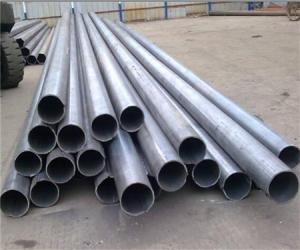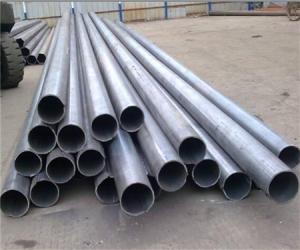Tubling and Casing Pipe made in China
- Loading Port:
- China Main Port
- Payment Terms:
- TT or LC
- Min Order Qty:
- 30 m.t.
- Supply Capability:
- 12000 m.t./month
OKorder Service Pledge
OKorder Financial Service
You Might Also Like
1、Structure of Seamless Pipe APL SPEC 5CT:
TUBING AND CASING PIPE
Standard: APL SPEC 5CT
● Application:
Tubing is used to extracting extract petroleum and
natural gas from a well.
Casing serves as walls of well.
Payment Terms: L/C D/A D/P T/T
Packing and shipment
Packaged in bundles,as per customers' requirements, it can also bepackagesd as beveled ends, typed marking, black painting, plastic caps protection,woven bags packing
For 20" container the max length is 5.8m; For 40" container the max length is 12m. other options are available based on customer requests. Please discuss when placing orders.
2、Main Features of the Seamless Pipe APL SPEC 5CT:
• High manufacturing accuracy
• High strength
• Small inertia resistance
• Strong heat dissipation ability
• Good visual effect
• Reasonable price
3、Seamless Pipe APL SPEC 5CT Specification:
Standard | GB, DIN, ASTM ASTM A106-2006, ASTM A53-2007 |
Grade | 10#-45#, 16Mn 10#, 20#, 45#, 16Mn |
Thickness | 8 - 33 mm |
Section Shape | Round |
Outer Diameter | 133 - 219 mm |
Place of Origin | Shandong, China (Mainland) |
Secondary Or Not | Non-secondary |
Application | Hydraulic Pipe |
Technique | Cold Drawn |
Certification | API |
Surface Treatment | factory state or painted black |
Special Pipe | API Pipe |
Alloy Or Not | Non-alloy |
Length | 5-12M |
Outer Diameter | 21.3-610mm |
Grade | 20#, 45#, Q345, API J55, API K55, API L80, API N80, API P110, A53B |
Standard | ASME, ASTM |
4、Packaging & Delivery
Packaging Details: | seaworthy package,bundles wrapped with strong steel strip |
Delivery Detail: | 15-30days after received 30%TT |
5、FAQ of Seamless Pipe APL SPEC 5CT:
①How is the quality of your products?
Our products are manufactured strictly according to national and internaional standard, and we take a test
on every pipe before delivered out. If you want see our quality certifications and all kinds of testing report, please just ask us for it.
Guaranteed: If products’ quality don’t accord to discription as we give or the promise before you place order, we promise 100% refund.
②How about price?
Yes, we are factory and be able to give you lowest price below market one, and we have a policy that “ for saving time and absolutely honest business attitude, we quote as lowest as possible for any customer, and discount can be given according to quantity”,if you like bargain and factory price is not low enough as you think, just don’t waste your time.Please trust the quotation we would give you, it is professional one.
③Why should you chose us?
Chose happens because of quality, then price, We can give you both.Additionally, we can also offer professional products inquiry, products knowledge train(for agents), smooth goods delivery, exellent customer solution proposals.Our service formula: good quality+good price+good service=customer’s trust
SGS test is available, customer inspection before shipping is welcome, third party inspection is no problem.
6、Seamless Pipe APL SPEC 5CT Images:
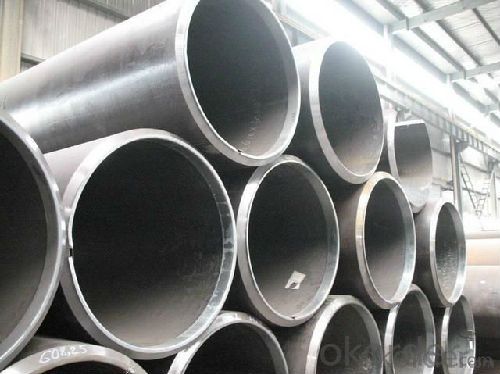
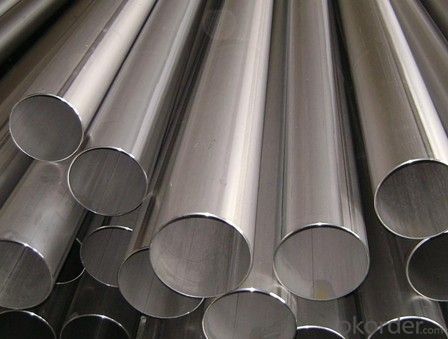
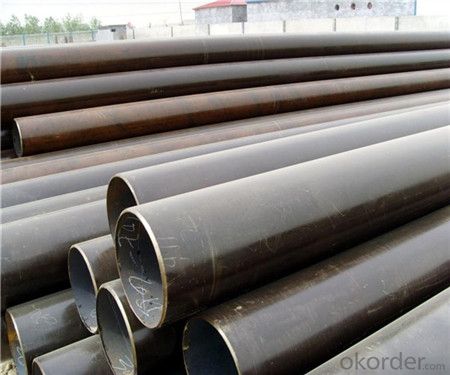
- Q:How are steel pipes protected against UV radiation?
- Steel pipes are typically protected against UV radiation through the application of coatings or paints that contain UV inhibitors. These coatings act as a barrier between the steel surface and the harmful UV rays, preventing damage and degradation of the pipes over time. Additionally, some steel pipes may be treated with zinc or other metals, which offer inherent UV protection and enhance the overall durability of the pipes.
- Q:How are steel pipes used in the construction of water supply systems?
- Steel pipes are commonly used in the construction of water supply systems due to their durability, strength, and resistance to corrosion. They are used for transporting water from sources such as reservoirs and wells to treatment plants, and then distributing it to homes, buildings, and other structures. Steel pipes are also used for transporting wastewater and sewage. Their ability to withstand high pressure and extreme weather conditions makes them ideal for ensuring a reliable and long-lasting water supply infrastructure.
- Q:Can steel pipes be used for conveying abrasive materials?
- Yes, steel pipes can be used for conveying abrasive materials. Steel pipes are known for their durability and resistance to wear, making them suitable for handling abrasive materials. Additionally, steel pipes can be lined with various protective coatings or linings to further enhance their resistance to abrasion and extend their lifespan.
- Q:How do you calculate the pipe thermal expansion coefficient for steel pipes?
- The pipe thermal expansion coefficient for steel pipes can be calculated using the formula: α = (L2 - L1) / (L1 * (T2 - T1)) Where: α is the pipe thermal expansion coefficient L1 is the initial length of the pipe L2 is the final length of the pipe T1 is the initial temperature of the pipe T2 is the final temperature of the pipe. This formula takes into account the change in length and the change in temperature to determine the coefficient of thermal expansion for steel pipes.
- Q:What are the limitations of using steel pipes?
- Some limitations of using steel pipes include their susceptibility to corrosion and rust, which can affect their durability and lifespan. Steel pipes are also relatively heavy and can be challenging to transport and install compared to lighter materials. Additionally, steel pipes may require more extensive maintenance and repairs due to their vulnerability to cracks and leaks.
- Q:How does the price of steel pipes vary based on market demand?
- The price of steel pipes varies based on market demand because when the demand for steel pipes is high, the prices tend to increase as suppliers can charge more for their products. Conversely, when the demand is low, the prices may decrease as suppliers may need to offer discounts or special deals to attract buyers. Essentially, the price of steel pipes fluctuates with changes in market demand.
- Q:How are steel pipes used in the manufacturing of food processing equipment?
- Steel pipes are commonly used in the manufacturing of food processing equipment due to their durability, strength, and resistance to corrosion. These pipes are used to create a network of channels and conveyors, allowing for the efficient transportation of various food products during the manufacturing process. Additionally, steel pipes are used for the supply of water, steam, and other fluids required for food processing, ensuring a hygienic and safe production environment.
- Q:What are the different types of steel pipe supports for offshore platforms?
- There are several types of steel pipe supports commonly used for offshore platforms, including but not limited to: 1. Clamps: These are used to secure and fasten pipes to the support structure, providing stability and preventing movement. 2. Hangers: These are used to suspend pipes from the support structure, allowing for flexibility and reducing stress on the pipes. 3. Guides: These are installed to control the movement and alignment of pipes, ensuring they stay in place and prevent damage during operation. 4. Shoes: These are used to support and distribute the weight of the pipe, typically at points where the pipe intersects with the support structure. 5. Saddles: These are designed to cradle the pipe and provide support, typically used for horizontal or inclined pipes. Each type of steel pipe support serves a specific purpose in ensuring the integrity and functionality of the offshore platform's piping system.
- Q:Can steel pipes be used for conveying potable water?
- Indeed, steel pipes have the capability to convey potable water. Nevertheless, there are certain factors and precautions that necessitate consideration. Steel pipes possess strength and durability, rendering them suitable for the transportation of water across significant distances. They are also resistant to corrosion and capable of enduring high levels of pressure. In order to guarantee the safety and quality of the water being conveyed, it is crucial to employ pipes that have been specifically designed and manufactured for potable water applications. These pipes are often equipped with coatings or linings composed of materials that inhibit the leaching of contaminants into the water, such as epoxy or cement mortar lining. Furthermore, regular maintenance and inspections should be conducted to prevent the accumulation of sediments or rust that could potentially impact the water quality. It is important to acknowledge that steel pipes may prove more costly in comparison to alternative materials such as plastic or copper. Nevertheless, their longevity and reliability render them a cost-effective choice in the long run. Adhering to local regulations and standards concerning the utilization of steel pipes for conveying potable water is also imperative to ensure the well-being and safety of consumers.
- Q:How are steel pipes used in the construction of dams?
- Steel pipes are commonly used in the construction of dams for various purposes. They are primarily used for the transportation of water within the dam structure, supplying water to turbines for hydroelectric power generation. Steel pipes are also used for drainage systems, allowing water to be discharged safely and efficiently. In addition, they are utilized for the construction of penstocks, which are large pipes that control the flow of water from the reservoir to the turbines. Overall, steel pipes play a crucial role in the infrastructure of dams, ensuring the efficient management and utilization of water resources.
1. Manufacturer Overview |
|
|---|---|
| Location | |
| Year Established | |
| Annual Output Value | |
| Main Markets | |
| Company Certifications | |
2. Manufacturer Certificates |
|
|---|---|
| a) Certification Name | |
| Range | |
| Reference | |
| Validity Period | |
3. Manufacturer Capability |
|
|---|---|
| a)Trade Capacity | |
| Nearest Port | |
| Export Percentage | |
| No.of Employees in Trade Department | |
| Language Spoken: | |
| b)Factory Information | |
| Factory Size: | |
| No. of Production Lines | |
| Contract Manufacturing | |
| Product Price Range | |
Send your message to us
Tubling and Casing Pipe made in China
- Loading Port:
- China Main Port
- Payment Terms:
- TT or LC
- Min Order Qty:
- 30 m.t.
- Supply Capability:
- 12000 m.t./month
OKorder Service Pledge
OKorder Financial Service
Similar products
New products
Hot products
Related keywords
